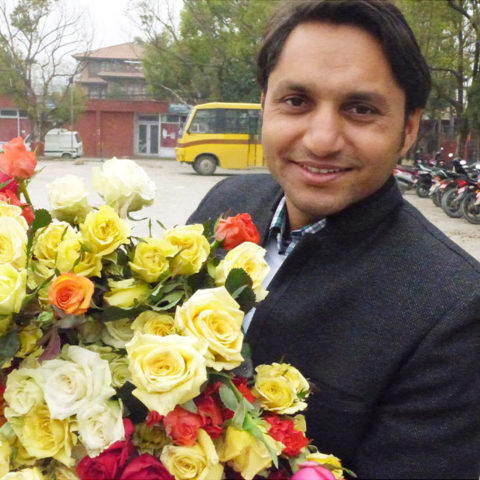
Flower Power: How roses have become a powerful weapon in the battle against stigma
Dr. Sushil Koirala ’The Rose Doctor’ has been a human rights and peace activist for over 15 years, and is the founder of the Rose Movement, a campaign to help bring peace and joy to others. We reached out to him to hear how his movement has become revolutionary in the fight against stigma as well.
Dr. Sushil Koirala first became involved with the leprosy community when he joined a TB and Leprosy Referral Centre run by a local NGO in his home country of Nepal. As he met more patients and was exposed to the difficulties they were facing, Dr. Koirala decided to expand on his famed Rose Movement by promoting the exchange of flowers as a symbol of acceptance and solidarity as well as peace.
Why roses? Dr. Koirala believes they best represent our diversity, yet our oneness, as human beings. ‘While Roses may be of different colours, a Rose is still a Rose…no matter what culture, language, colour, ethnicity, or religion we may come from or represent, we are all human’. Dr. Koirala sees roses in bloom as another symbol, for children growing to their full potential; he wishes to create an environment where they can grow to their full bloom, as he believes this is the best way in which to make the world a better place.
What once was a movement for peace soon grew into something much more. Dr. Koirala began to hand out roses to his patients, including those with leprosy. He could see the stigma and discrimination that they faced, from themselves and others; he wanted a way to show them that they were cared for and accepted in society.
‘They need to be healed; treatment alone was not enough.’
Something that Dr. Koirala soon noticed was that the stigma expanded beyond communities; into healthcare organizations, hospitals, and healthcare providers as well. He even noticed that those who were willing to help leprosy communities were associated with this stigma as well. Despite the well-thought training programs on stigma in HIV treatment, there were no such trainings on Multi-Drug-Resistant TB, or leprosy in Nepal. In response, he began to use his roses as a tool to inspire others and begin the conversation about the social exclusion associated with these diseases. In Nepal, Dr. Sushil along with other healthcare workers have organized Rose Ceremonies as a way to raise the issue of discrimination and stigma in their own workplaces and society.
‘What we see … in leprosy is only the tip of the iceberg, this is just the manifestation of a large scale of stigma, discrimination and prejudice against various diseases, including mental health, disabilities and so on’, says Dr. Koirala, who hopes that tackling health-related stigma will soon be central to the International Human Rights agenda.
‘Just like broad spectrum antibiotics, I use roses for multi-purpose at various occasions and events. The key objective is the same: promoting peace, harmony, happiness, human rights, human dignity, good health, bringing out the best in people, reducing or ending stigma and discrimination. But we are also accepting the fact that we are all one human family.’
Dr. Koirala currently serves as a country representative for Nepal for the Damien Foundation.